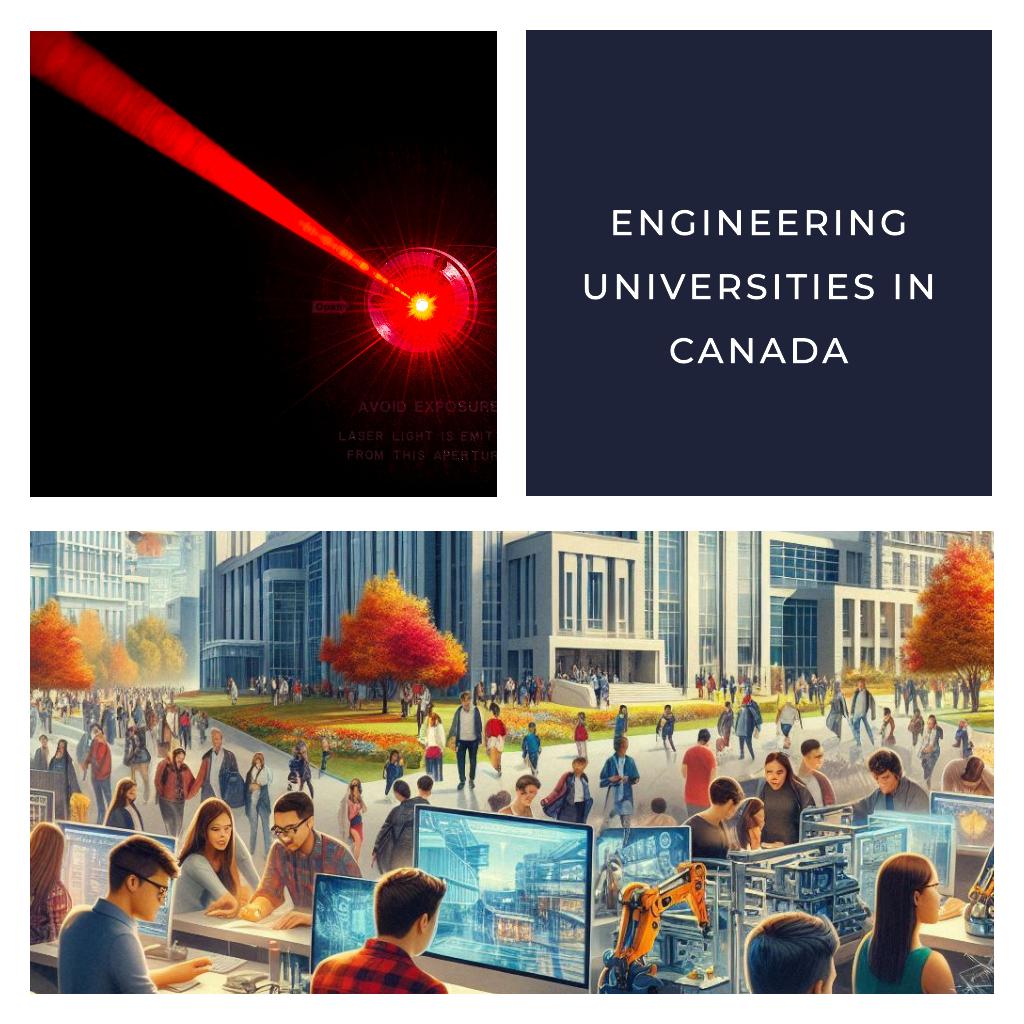Discover top Engineering Universities in Canada offering cutting-edge programs and research opportunities. Explore renowned institutions like the University of Calgary, Centennial College, and more. Find out why Canada is a leading destination for engineering education.
Table of Contents
Best Engineering Universities in Canada for International Students
If you’re an international student aiming to pursue a degree in engineering, Canada offers a wealth of opportunities thanks to its prestigious institutions, inclusive culture, and high standard of living. This guide delves into some of the best engineering universities in Canada for international students, highlighting what makes each institution unique and how you can benefit from studying there.

Why Choose Canada for Engineering?
Canada is an attractive destination for engineering students for several compelling reasons:
1. High-Quality Education
Rigorous Academic Standards: Canadian engineering programs are consistently ranked among the best globally due to their rigorous academic standards. Institutions like the University of Toronto, the University of British Columbia, and McGill University have engineering faculties that emphasize not only theoretical knowledge but also practical application.
Accredited Programs: Canadian engineering programs are accredited by the Canadian Engineering Accreditation Board (CEAB), ensuring that they meet high standards of quality and relevance. This accreditation is crucial for graduates aiming to become licensed Professional Engineers (P.Eng) in Canada and other jurisdictions.
Innovative Curriculum: Canadian engineering schools frequently update their curricula to reflect the latest technological advancements and industry trends. This dynamic approach ensures that students are well-prepared for the evolving demands of the engineering profession.
2. Diverse Environment
Inclusive Society: Canada is known for its commitment to diversity and inclusion. This multicultural environment fosters a rich educational experience, where students from different backgrounds contribute varied perspectives and ideas.
Global Networking Opportunities: The diversity of students and faculty members at Canadian institutions offers extensive networking opportunities on a global scale. Engaging with peers and professionals from different cultures can enhance collaborative skills and open doors to international career opportunities.
Supportive Campus Culture: Canadian universities typically offer robust support systems for international students, including orientation programs, academic advising, and cultural integration services. This support helps ease the transition to studying and living in a new country.
3. Cutting-Edge Research
Research Excellence: Canadian engineering schools are at the forefront of research and innovation. Institutions such as the University of Waterloo and the École Polytechnique de Montréal are known for their significant contributions to fields like robotics, aerospace engineering, and environmental sustainability.
Industry Collaboration: Many Canadian universities have strong partnerships with industry leaders, facilitating cutting-edge research projects and providing students with opportunities to work on real-world problems. These collaborations often result in hands-on experiences and internships that are invaluable for career development.
Government and Private Sector Funding: Canada invests heavily in research and development through various funding programs and initiatives. This financial support enables engineering schools to pursue groundbreaking research and maintain state-of-the-art facilities.
4. Additional Advantages
Quality of Life: Canada offers a high standard of living, with safe cities, beautiful natural landscapes, and a strong healthcare system. This quality of life contributes to a positive overall student experience.
Post-Graduation Opportunities: Graduates from Canadian engineering programs often find robust employment opportunities, both within Canada and internationally. Canada’s growing technology sector and emphasis on innovation create a demand for skilled engineers.
Pathways to Permanent Residency: Canada provides pathways for international students to stay and work in the country after graduation. Programs like the Post-Graduation Work Permit (PGWP) allow graduates to gain valuable work experience, which can lead to permanent residency opportunities.
Overall, Canada’s combination of high-quality education, diverse and inclusive environment, and leading-edge research makes it an exceptional destination for aspiring engineers.
Top Engineering Universities in Canada for International Students
1. Centennial College
Courses: Centennial College, located in Toronto, Ontario, offers a range of engineering technology programs designed to provide practical and hands-on experience. Notable programs include:
- Electrical Engineering Technology: Focuses on electrical systems, electronics, and power systems.
- Mechanical Engineering Technology: Covers mechanical systems, manufacturing processes, and mechanical design.
- Chemical Engineering Technology: Emphasizes chemical processes, laboratory techniques, and industrial safety.
- Automation and Robotics Engineering Technology: Deals with automation systems, robotics, and control systems.
Cost: For international students, the tuition fees generally range from CAD 15,000 to CAD 18,000 per year. Domestic students pay approximately CAD 3,000 to CAD 4,000 per year. These figures can vary based on the program and additional fees.
Ranking: Centennial College is highly regarded for its applied programs and strong industry connections. While it may not be ranked among the top universities globally, it is well-respected for practical training and job readiness. Its programs are designed to prepare students for the workforce immediately upon graduation.
Eligibility:
- International Students: Must have completed secondary education with good academic standing. Proof of English proficiency is required, typically with a minimum IELTS score of 6.5 or TOEFL score of 88. Some programs may have additional specific requirements.
- Domestic Students: High school diploma or equivalent with required course prerequisites. Admission is based on academic performance and specific program requirements.
2. Douglas College
Courses: Douglas College in New Westminster, British Columbia, offers applied programs that focus on practical skills:
- Engineering Design and Drafting Technology: Focuses on technical drawing, design principles, and CAD software.
- Electronic Engineering Technology: Covers electronics, digital systems, and communication systems.
Cost: International students typically face tuition fees between CAD 13,000 and CAD 16,000 per year. Domestic students pay approximately CAD 3,000 to CAD 4,000 per year. Costs can vary depending on the program and additional fees.
Ranking: Douglas College is known for its focus on practical, hands-on education and strong community ties. It is well-regarded for its applied programs and career-oriented training, though it does not rank highly on global university rankings.
Eligibility:
- International Students: Completion of secondary school with good academic standing. English proficiency is required, usually with a minimum IELTS score of 6.5 or TOEFL score of 88. Specific course prerequisites may apply.
- Domestic Students: High school diploma or equivalent with required course prerequisites. Admission criteria are based on academic performance and program-specific requirements.
3. University of Calgary
Courses: The University of Calgary in Alberta offers a broad range of engineering programs, including:
- Electrical and Computer Engineering: Covers electronics, electrical systems, and computer systems.
- Mechanical Engineering: Focuses on mechanical systems, dynamics, and thermal systems.
- Civil Engineering: Deals with infrastructure, structural design, and environmental engineering.
- Chemical Engineering: Emphasizes chemical processes, reaction engineering, and process control.
- Software Engineering: Covers software development, algorithms, and systems design.
Cost: For international students, tuition fees range from CAD 20,000 to CAD 25,000 per year. Domestic students pay around CAD 5,000 to CAD 8,000 per year. These costs include tuition but may not cover additional fees such as lab fees or health insurance.
Ranking: The University of Calgary is ranked among the top universities in Canada and is known for its strong engineering programs. It is frequently listed within the top 200 to 300 universities worldwide. The university is recognized for its research output, innovation, and academic excellence.
Eligibility:
- International Students: High school graduation with strong academic performance. Proof of English proficiency is required, typically with a minimum IELTS score of 6.5 or TOEFL score of 86. Meeting specific program prerequisites is also necessary.
- Domestic Students: High school diploma with appropriate course prerequisites. Admission is based on academic performance and competitive entry requirements.
4. LaSalle College
Courses: LaSalle College in Montreal, Quebec, offers applied engineering technology programs:
- Civil Engineering Technology: Focuses on construction, infrastructure, and civil design.
- Mechanical Engineering Technology: Covers mechanical systems, design, and manufacturing processes.
Cost: International students usually pay between CAD 15,000 and CAD 20,000 per year. Domestic students generally face tuition fees around CAD 3,000 to CAD 4,000 per year. Additional costs such as textbooks and lab fees may apply.
Ranking: LaSalle College is known for its vocational and technical training, particularly in Quebec. It emphasizes practical skills and industry readiness rather than academic research. It has a solid reputation locally but may not be as recognized on a global scale.
Eligibility:
- International Students: Completion of secondary education with good academic standing. Proof of English proficiency is typically required, with a minimum IELTS score of 6.5 or TOEFL score of 86. Specific program prerequisites may also apply.
- Domestic Students: High school diploma or equivalent with necessary course prerequisites. Admission is based on academic performance and program-specific requirements.
5. Acadia University
Courses: Acadia University in Wolfville, Nova Scotia, offers specialized programs:
- Environmental Engineering: Focuses on environmental systems, sustainability, and pollution control.
- Engineering Physics: Combines principles of engineering and physics, with an emphasis on applied physics and technology.
Cost: International students typically pay tuition fees ranging from CAD 17,000 to CAD 22,000 per year. Domestic students pay around CAD 6,000 to CAD 8,000 per year. Additional costs for textbooks, materials, and other fees may apply.
Ranking: Acadia University is known for its strong undergraduate programs and personalized education. It is generally ranked within the top 30 universities in Canada and is recognized for its focus on teaching and student experience. It is less prominent in global rankings compared to larger research institutions.
Eligibility:
- International Students: High school graduation with strong academic performance. Proof of English proficiency is required, typically with a minimum IELTS score of 6.5 or TOEFL score of 86. Specific program prerequisites may apply.
- Domestic Students: High school diploma with relevant course prerequisites. Admission is based on academic performance and specific program requirements.
Summary
- Centennial College and Douglas College are ideal for students seeking practical, applied engineering programs with lower tuition fees and a focus on career readiness.
- University of Calgary offers a wide range of engineering programs with a strong emphasis on research and high international recognition.
- LaSalle College provides vocational training with practical skills and is well-regarded locally in Quebec.
- Acadia University offers specialized engineering programs with a focus on undergraduate education and personalized learning.
Each institution has unique strengths and is suited to different academic and career goals. Consider what aligns best with your interests, financial situation, and long-term objectives when making a decision.

